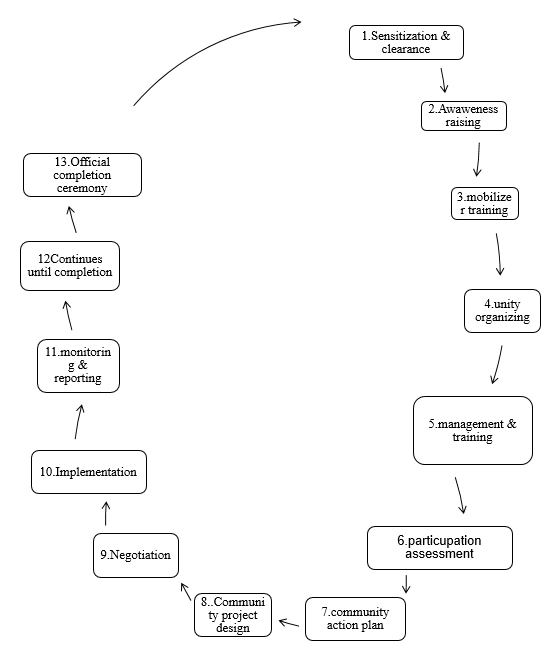-Community empowerment cycle refers to a systematic approach of activities or a series of interventions in a logical and progressive order that the empowerment process goes through.
-Empowerment is carried out by legitimate authorized recognized mobilizers.
- Empowerment is also called a community mobilizing cycle or community motivation cycle.
-It uses community choice of action as a means of strengthening community empowerment.
-Empowerment cycle requires the change agents to be well informed and sensitive to the community characteristics .i.e. their culture, customs, beliefs etc.
-Is used to promote and encourage the community members to develop the skills necessary for support.
-The change agents have now encompassed community empowerment program in their agenda in order to educate and inspire residents in the community to take the initiative of their own development.
-It involves all actions that have to be taken to successfully plan and execute anything any empowerment program/ activities. These are the activities geared towards provision of orderly alignment of the people and the resources used by the community in the development of it’s and development.

1. Sensitization and clearance:
-This phase in involves change agencies getting acceptance and licensing from the rightful authority about their empowerment program. They have to explain to the authority what they intend to do and why so as to set a green light to proceed to their program.
2. Awareness raising
-It involves making the community members know of what they intend to do and how they intend to do it and finally how it will be beneficial to the community.
3. Unity organizing:
No community is unified; there are schisms and factions in every one. The degree varies. When there is much social disparity, it is more difficult to reach a community consensus of the priority problem, and thus the priority goal.
Unity organizing is a necessary precedent to most community mobilization, and continues throughout the cycle as needed.
4. Mobilizer training
-The change agents are trained on how to carry out the empowerment process. Some members of the community will be trained as well as to help in the empowerment process.
5. Community organizing.
-Development cannot take place where there’s no unity. When members of the community are concerned with their own things different, it will be difficult to lead to empowerment .It’s important to unite the community members to participate in one project or program.
6. Management Training.
-It involves training of community members on ways of planning, organizing, directing and managing of their own development program.
7. Participating assessment.
-It involves judging the importance of participation of community members in the development program in terms of its impact on the entire program.
8. Community action plan.
It involves setting the community objectives. In this regard the community members state what it intends to achieve how to do it and what it expects out of the program.
9. Community project design.
-It involves putting some structures in place that will facilitate empowerment program. The project design will indicate the time of activity that will take place how it will be done, who will do it.
10. Negotiations-These is the phase where talks are put in place to find out what the community would like and what they wouldn’t like in the community empowerment program. What the community needs would be the first priority in the empowerment priority in the empowerment.
11. Implementation-It involves the execution of empowerment activities. It entails some degree of work .e.g. scheduling, cost estimating, information system, design of monitoring and control projects.
12. Writing and reporting
-It involves keeping track off and systematically on empowerment activity. Change agents monitor and they report continuously the activities or the process to their agencies as well as follow change agents and community members. This enables decision making to be done about the empowerment process.
13. Continues until completion
-This is the phase where empowerment activities are carried out to the end.
14. Official completion ceremony
-It involves bringing all the stakeholders together and ending the empowerment process. At this point the failure or success of the empowerment program will be known.
Kavungya answered the question on
August 11, 2021 at 06:04